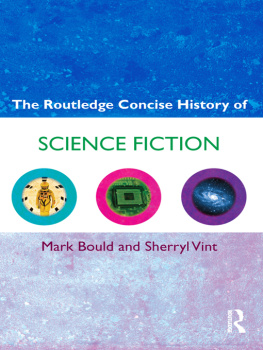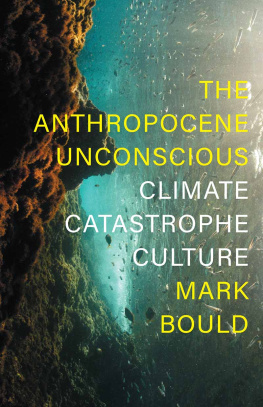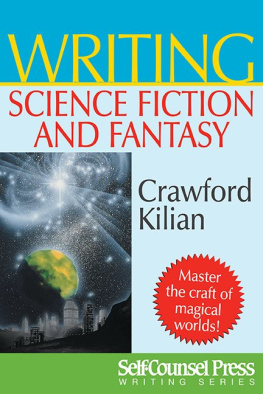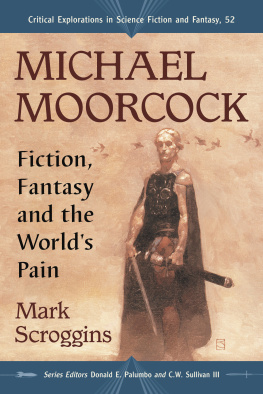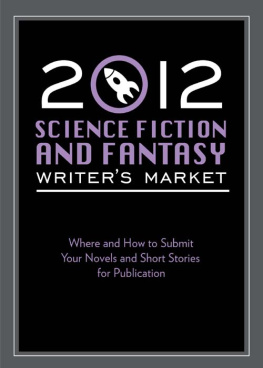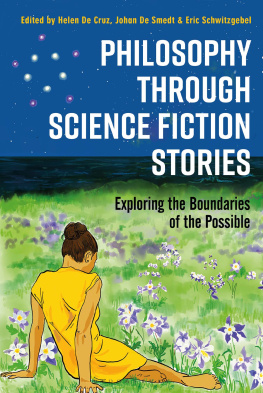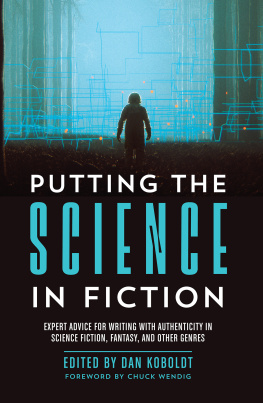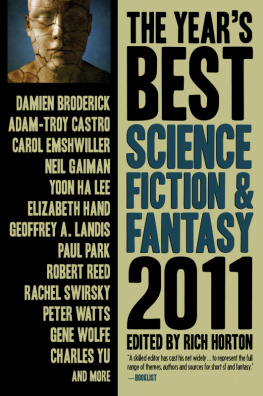The Routledge Concise History of Science Fiction
The term science fiction has an established common usage, but close examination reveals that writers, fans, editors, scholars and publishers often use this word in different ways for different reasons. Exploring how science fiction has emerged through competing versions and the struggle to define its limits, this Concise History :
provides an accessible and clear overview of the development of the genre
traces the separation of sf from a broader fantastic literature and the simultaneous formation of neighbouring genres, such as fantasy and horror
shows the relationship between magazine and paperback traditions in sf publishing
is organised by theme and presented chronologically
uses text boxes throughout to highlight key works in sf traditions including dystopian, apocalyptic and evolutionary fiction
includes a short overview and bullet-pointed conclusion for each chapter.
Discussing the place of key works and looking forward to the future of the genre, this book is the ideal starting point both for students and all those seeking a better understanding of science fiction.
Mark Bould is Reader in Film and Literature at the University of the West of England and an editor of Science Fiction Film and Television .
Sherryl Vint is Associate Professor of English at Brock University, Canada, and the Director of the Interdisciplinary MA in Popular Culture.
Routledge Concise Histories of Literature series
The Routledge Concise Histories of Literature series offers students and ademicsalike an interesting and accessible route into the literature of a specific period, genre, place or topic. The books situate the literature within its broader historical, cultural and political contexts, introducing the key events, movements and theories necessary for a fuller understanding of the writing. They engage readers in the debates of the period, genre or region adding a more exciting and challenging element to the reading.
Accessible and engaging, offering suggestions for further reading, explanatory text boxes, bullet pointed chapter summaries and a glossary of key terms, the Routledge Concise Histories are the ideal starting point for the study of literature.
Available:
The Routledge Concise History of Southeast Asian Writing in English
By Rajeev S. Patke and Philip Holden
The Routledge Concise History of Nineteenth-Century Literature
By Josephine Guy and Ian Small
The Routledge Concise History of Science Fiction
By Mark Bould and Sherryl Vint
Forthcoming:
The Routledge Concise History of Canadian Literature
By Richard J. Lane
The Routledge Concise History
of Science Fiction
Mark Bould and Sherryl Vint

First edition published 2011 by Routledge
2 Park Square, Milton Park, Abingdon, OX14 4RN
Simultaneously published in the USA and Canada by Routledge
270 Madison Ave, New York, NY 10016
Routledge is an imprint of the Taylor & Francis Group, an informa business
2011 Mark Bould and Sherryl Vint
The rights of Mark Bould and Sherryl Vint to be identified as authors of this work have been asserted by them in accordance with sections 77 and 78 of the Copyright, Designs and Patents Act 1988.
Printed and bound in Great Britain by TJ International Ltd, Padstow, Cornwall
All rights reserved. No part of this book may be reprinted or reproduced or utilised in any form or by any electronic, mechanical, or other means, now known or hereafter invented, including photocopying and recording, or in any information storage or retrieval system, without permission in writing from the publishers.
British Library Cataloguing in Publication Data
A catalogue record for this book is available from the British Library
Library of Congress Cataloging in Publication Data
Bould, Mark.
The Routledge concise history of science fiction / Mark Bould and Sherryl Vint. 1st ed.
p. cm.
Includes bibliographical references and index.
1. Science fictionHistory and criticism. I. Vint, Sherryl, 1969- II. Title.
III. Title: Concise history of science fiction.
PN3433.5.B68 2011
809.38762dc22
2010035731
ISBN: 978-0-415-43570-3 (hbk)
ISBN: 978-0-415-43571-0 (pbk)
ISBN: 978-0-203-83016-1 (ebk)
For Douglas Barbour, Veronica Hollinger, Patrick Parrinder and Brian Stableford. Responsible, but hardly to blame.
Contents
Preface
Writing the history of science fiction (SF) is an impossible task, and even writing a history is daunting, as there are many competing perspectives on what properly counts as SF and therefore a history of the genre must necessarily be selective. We are keenly aware of both our emphases and our omissions. While we attempt throughout to indicate SFs existence in multiple media, the series of which this book is a part requires us to focus almost exclusively on SF as a literature. Within that framework, we have concentrated on Anglophone SF and authors primarily from the US and the UK, along with Canada and Australia, and on American cultural history, although there are strong traditions of SF in many other languages and countries. These other SF traditions circulate in distinct national and cultural contexts to which an introductory volume such as this cannot possibly do justice, and since we are both monolingual and our expertise lies in Anglophone literature, we would only be able to discuss non-Anglophone texts in translation. Doing so would sever them from their original context and meanings, and inevitably reinforce the limited view of these other literatures created by the processes by which only certain texts are selected for translation. Generally, then, our discussions of non-Anglophone writers focuses on those whose translated work has had an influence on how SF is produced and consumed in Anglophone countries; for example, our treatment of Jules Verne is concerned with how he was understood by Anglophone readers and does not engage with his rather different reception in French popular and literary culture.
We have selected as the focus of this history a tradition of texts that can be seen to be in conversation with one another as the idea of SF emerged and morphed through negotiations over which texts and voices were or were not to be considered part of it. We have also aimed to convey something of the breadth and variety of this SF. We have sometimes selected what might be considered exemplary texts, at other times typical ones. We have included pulp fiction, middlebrow literature and more experimental forms, ranging from space-opera adventures to political interventions, from rigorous hard-SF extrapolations to playful postmodern allusions. This has often placed a heavy burden on individual texts and authors, requiring them to stand in for large bodies of work, so we have tried to point to additional titles wherever possible, including the interpolated text boxes and the Guide to further reading.
Following an introduction that explains our understanding of SF as an ongoing process rather than a fixed entity, this book is organised chronologically todemonstrate the ways in which SF changed over time as new writers and styles became or failed to become part of the genre, and as others faded in significance. We trace the separation of SF from a broader fantastic literature and the simultaneous formation of neighbouring genres, such as fantasy and horror; and how these never entirely convincing distinctions have shifted over time, to the point that some critics now consider them to be dissolving. Because the careers of many of the figures we discuss span several decades, we have often focused on their work in a single specific period, when their influence was most strongly felt or their fiction offered particular insights into broader cultural contexts. One of the peculiarities of publication in the US magazine and paperback tradition of SF is that many stories originally published in magazines were later republished in books, often significantly revised and expanded and frequently without any indication of the changes that had been made. We have elected to discuss such texts in the decade in which the original version was published, giving the original publication details and noting when novels or linked stories have later appeared in book form; this also serves to indicate the influence of certain magazines in specific periods and of patterns of publication in keeping certain authors and texts in circulation. (However, to minimise potential clutter we have not included titles of anthologies or collections in which certain stories first appeared; such information is easily available through internet resources such as The Internet Speculative Fiction Database (http://www.isfdb.org).)

